Unit4 Then and now 课件(共51张PPT)
文档属性
| 名称 | Unit4 Then and now 课件(共51张PPT) | 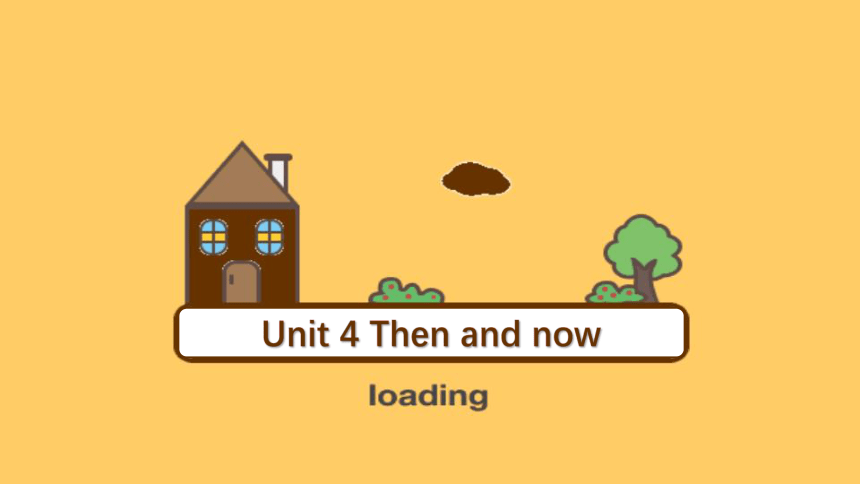 | |
| 格式 | zip | ||
| 文件大小 | 5.9MB | ||
| 资源类型 | 教案 | ||
| 版本资源 | 牛津译林版 | ||
| 科目 | 英语 | ||
| 更新时间 | 2022-06-29 16:14:54 | ||
图片预览

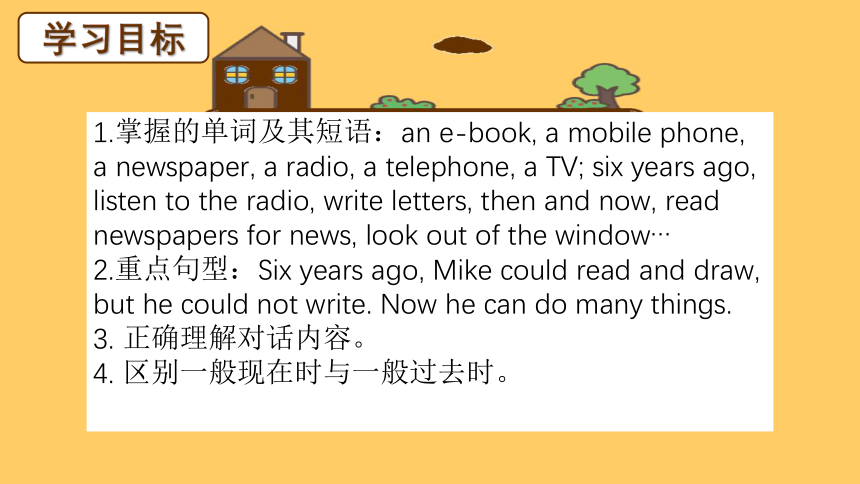
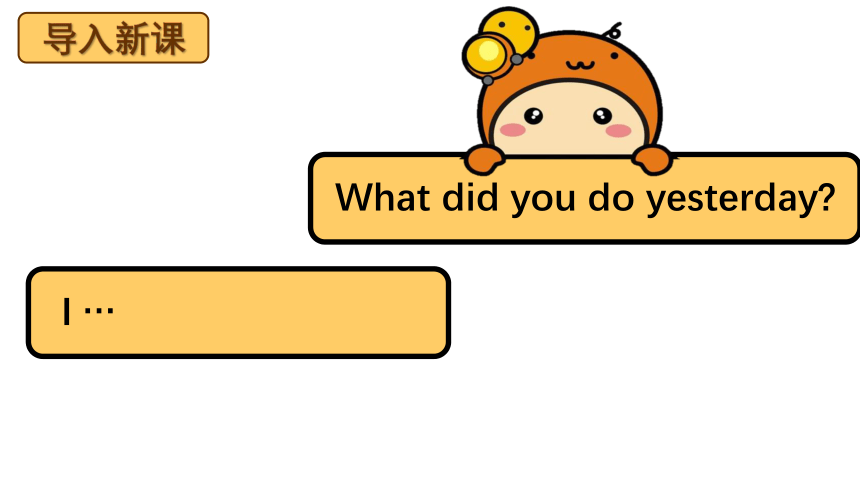
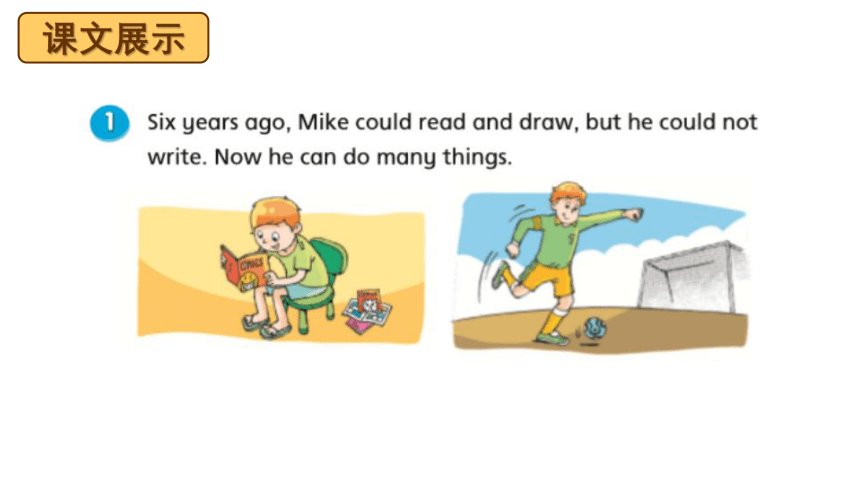
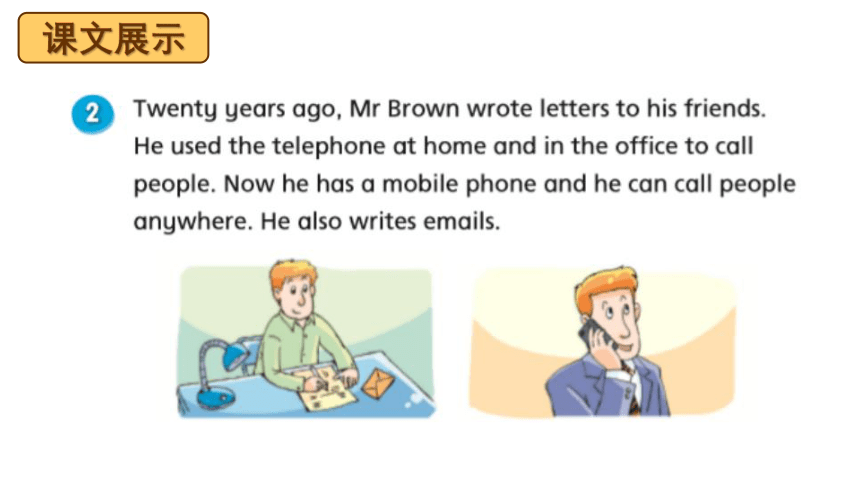
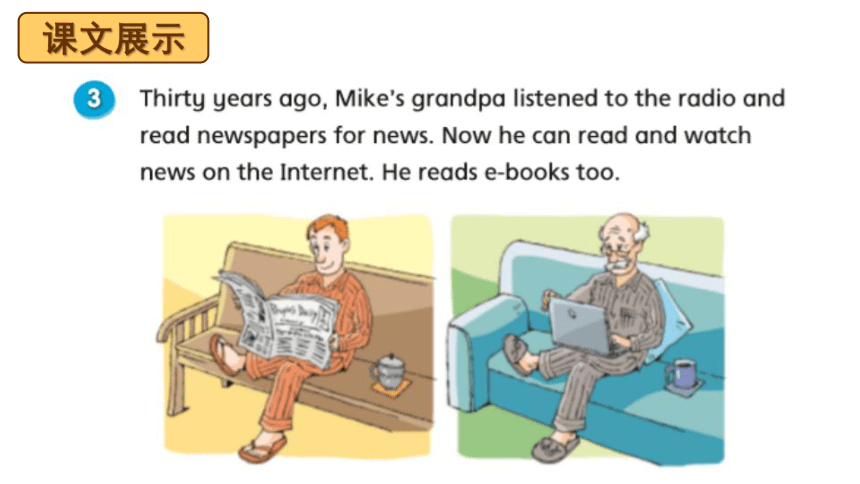
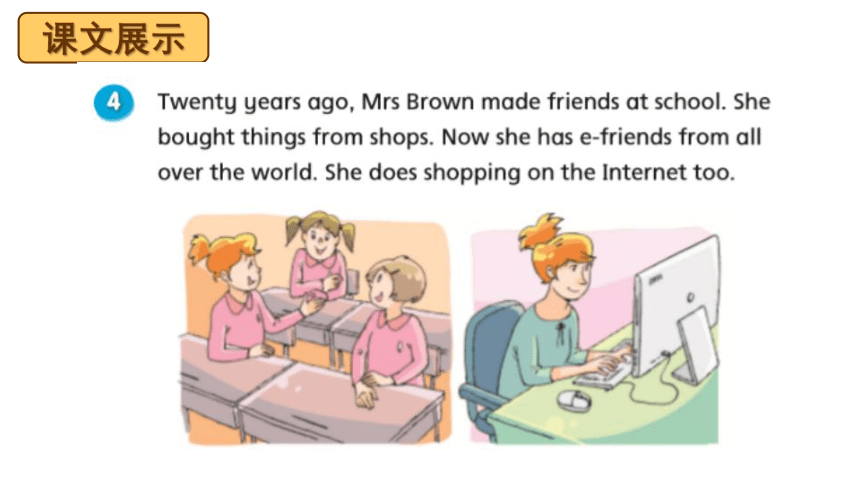
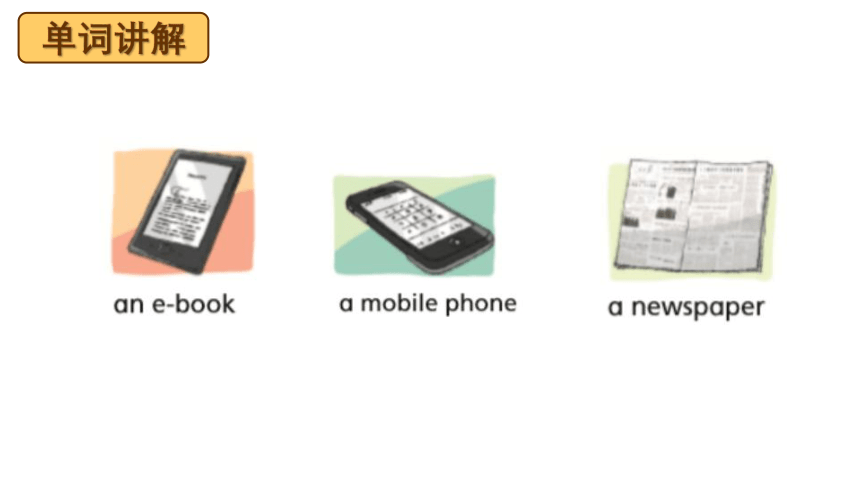
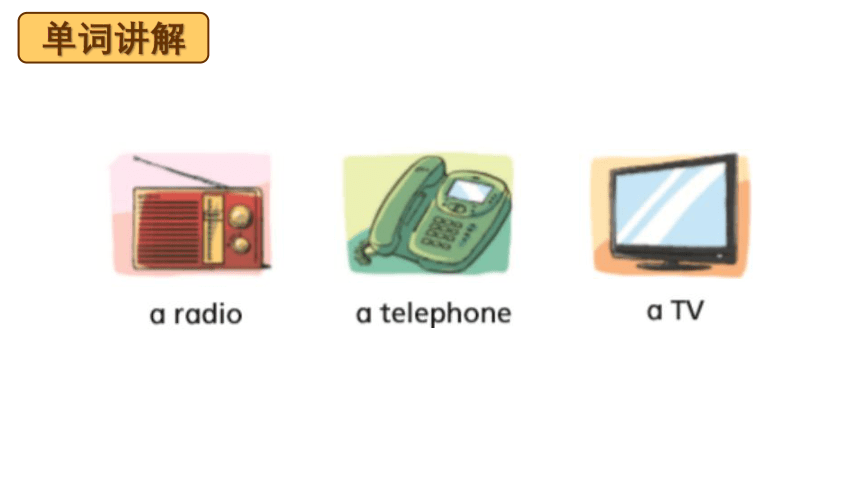
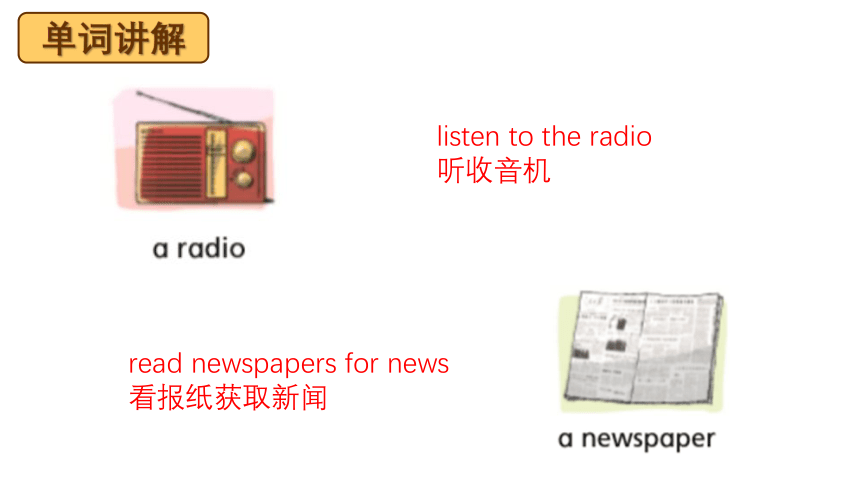
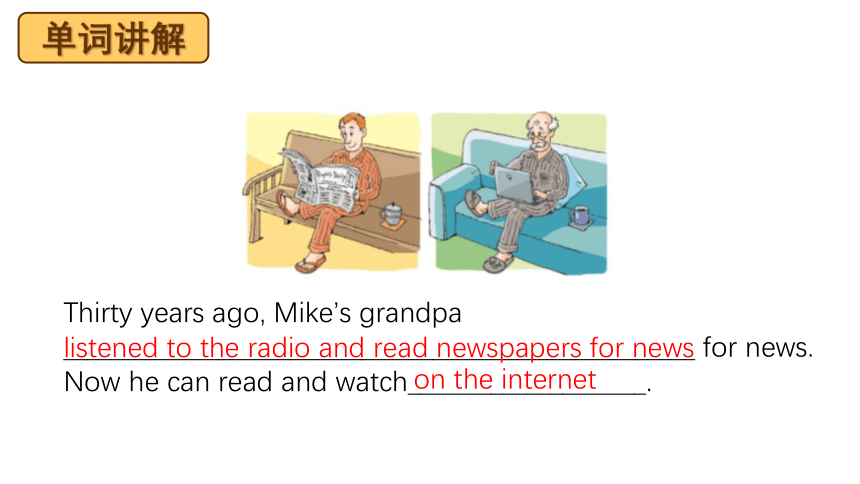
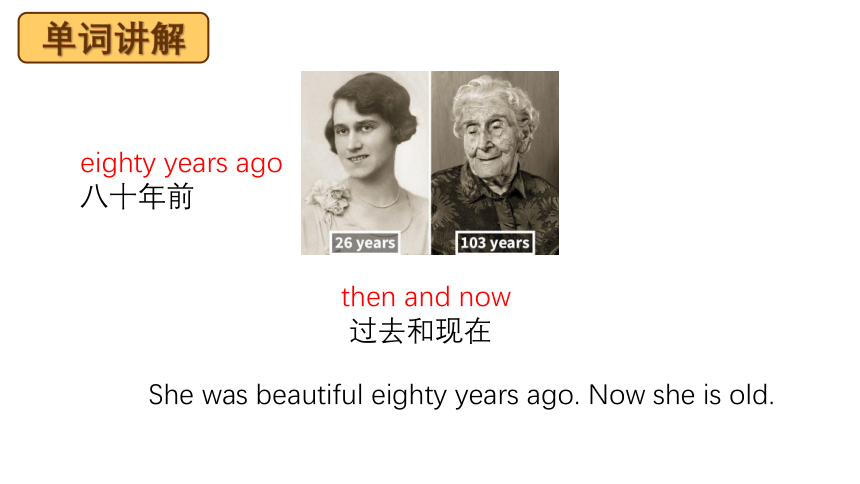
文档简介
(共51张PPT)
Unit 4 Then and now
学习目标
1.掌握的单词及其短语:an e-book, a mobile phone, a newspaper, a radio, a telephone, a TV; six years ago, listen to the radio, write letters, then and now, read newspapers for news, look out of the window…
2.重点句型:Six years ago, Mike could read and draw, but he could not write. Now he can do many things.
3. 正确理解对话内容。
4. 区别一般现在时与一般过去时。
导入新课
What did you do yesterday
I …
课文展示
课文展示
课文展示
课文展示
单词讲解
单词讲解
单词讲解
listen to the radio
听收音机
read newspapers for news 看报纸获取新闻
单词讲解
Thirty years ago, Mike’s grandpa
_____________________________________________________ for news.
Now he can read and watch____________________.
listened to the radio and read newspapers for news
on the internet
单词讲解
then and now
过去和现在
She was beautiful eighty years ago. Now she is old.
eighty years ago
八十年前
单词讲解
What could you do six years ago
What can you do now
单词讲解
write letters (to sb.) (给某人写信)
Mr Brown wrote letters to his friends. 布朗先生给他的朋友写信。
letter 信
单词讲解
write emails (to sb.)
(给某人)写电子邮件
email
单词讲解
He __________ __________ to his friends before.
He __________ __________ to his friends now.
wrote letters
wrote emails
单词讲解
at home 在家
What do you do at home
I …
单词讲解
make friends 交朋友
Do you have friends
Yes, my friend is …/ Yes, my friends are…
Where did you meet
I met……
单词讲解
do shopping on the internet 在网上购物
翻译:我妈妈经常在网上购物。
My mum often does shopping on the internet.
单词讲解
on the internet 在网上
说一说:
What do you usually do on the Internet
What does your father/mother usually do on the Internet
单词讲解
look out of the window朝窗外看
单词讲解
Wait for 等待
She is waiting for the bus.
她正在等公交车。
游戏时间
newspaper
make friends
write email
过去和现在
写信
在网上
radio
e-friend
二十年前
游戏规则:(1)两位同学(2)学生圈出老师念的词组或者汉语意思(3)三个圈成一条直线者胜出
重点句型
Can you spell…
你能拼写…吗
重点句型
What’s this?
It’s a ……
Can you spell…
你能拼写…吗
重点句型
What’s this?
It’s a ……
Can you spell…
你能拼写…吗
重点句型
What’s this?
It’s a ……
Can you spell…
你能拼写…吗
重点句型
What’s this?
It’s a ……
Can you spell…
你能拼写…吗
连连看
a radio
a telephone
a TV
an e-book
a mobile phone
a newspaper
重点句型
Make a sentence with “egg”.
用“egg”造一个句子。
重点句型
Could you make a sentence with “I could”?
重点句型
Could you make a sentence with “six years ago”?
重点句型
Could you make a sentence with “write emails”?
重点句型
Twenty years ago, Mrs Brown bought things from shops.
Now she does shopping on the Internet.
重点句型
write
letters
telephone
Now Mike can…
Six years ago, Mike couldn’t …
重点句型
重点句型
重点句型
Where did you go for the holiday
What did you do there
How was the weather
I went…
I…
It was …
重点句型
Where did you go for the holiday
What did you do there
How was the weather
I went…
I…
It was …
重点句型
Where did you go for the holiday
What did you do there
How was the weather
I went…
I…
It was …
重点句型
Make a holiday album and give a report.
语法讲解
语法讲解
一般过去时
一般过去时结构:
定义:
过去某个时间里发生的动作或状态
主语+动词过去式+其他
语法回顾
时间词:
yesterday,last year,before,three years ago,long long ago…
一般现在时
一般现在时结构:
定义:
现在某个时间里发生的动作或状态;
现在持续性、经常性的动作或状态。
主语+动词现在时(注意三单情况)+其他
语法回顾
时间词:
now, at present, usually, everyday, often, twice a week, always
语法讲解
walk
draw
语法讲解
read
语法讲解
cook
ride a bike
1. I ________ (have) an exciting party last weekend.
2. What ______ Tom usually ________ (do) on Saturday evening
He __________ (watch) TV and __________ (read) an interesting book.
3. They all ______ (go) to the park yesterday morning.
4. She _______________ (not visit) her aunt last weekend.
She _________(stay) at home and ________(do) some cleaning.
5. When Yang Ling was one year old, she______________ (can not) walk.
had
does
do
watches
reads
课堂练习
went
didn’t visit
stayed
did
couldn’t
课堂小结
1.本课学习了重点单词:an e-book, a mobile phone, a newspaper, a radio, a telephone, a TV; six years ago, listen to the radio, write letters, then and now, read newspapers for news, look out of the window…
2.重点句型:
Six years ago, Mike could read and draw, but he could not write. Now he can do many things.
3. 区别一般现在时与一般过去时。
家庭作业
1.Recite new words and useful expressions.
2.Write 5 sentences with “I could…”, “I couldn’t ”, “I didn’t…”, “Now I’m…”, “I can…”
Unit 4 Then and now
学习目标
1.掌握的单词及其短语:an e-book, a mobile phone, a newspaper, a radio, a telephone, a TV; six years ago, listen to the radio, write letters, then and now, read newspapers for news, look out of the window…
2.重点句型:Six years ago, Mike could read and draw, but he could not write. Now he can do many things.
3. 正确理解对话内容。
4. 区别一般现在时与一般过去时。
导入新课
What did you do yesterday
I …
课文展示
课文展示
课文展示
课文展示
单词讲解
单词讲解
单词讲解
listen to the radio
听收音机
read newspapers for news 看报纸获取新闻
单词讲解
Thirty years ago, Mike’s grandpa
_____________________________________________________ for news.
Now he can read and watch____________________.
listened to the radio and read newspapers for news
on the internet
单词讲解
then and now
过去和现在
She was beautiful eighty years ago. Now she is old.
eighty years ago
八十年前
单词讲解
What could you do six years ago
What can you do now
单词讲解
write letters (to sb.) (给某人写信)
Mr Brown wrote letters to his friends. 布朗先生给他的朋友写信。
letter 信
单词讲解
write emails (to sb.)
(给某人)写电子邮件
单词讲解
He __________ __________ to his friends before.
He __________ __________ to his friends now.
wrote letters
wrote emails
单词讲解
at home 在家
What do you do at home
I …
单词讲解
make friends 交朋友
Do you have friends
Yes, my friend is …/ Yes, my friends are…
Where did you meet
I met……
单词讲解
do shopping on the internet 在网上购物
翻译:我妈妈经常在网上购物。
My mum often does shopping on the internet.
单词讲解
on the internet 在网上
说一说:
What do you usually do on the Internet
What does your father/mother usually do on the Internet
单词讲解
look out of the window朝窗外看
单词讲解
Wait for 等待
She is waiting for the bus.
她正在等公交车。
游戏时间
newspaper
make friends
write email
过去和现在
写信
在网上
radio
e-friend
二十年前
游戏规则:(1)两位同学(2)学生圈出老师念的词组或者汉语意思(3)三个圈成一条直线者胜出
重点句型
Can you spell…
你能拼写…吗
重点句型
What’s this?
It’s a ……
Can you spell…
你能拼写…吗
重点句型
What’s this?
It’s a ……
Can you spell…
你能拼写…吗
重点句型
What’s this?
It’s a ……
Can you spell…
你能拼写…吗
重点句型
What’s this?
It’s a ……
Can you spell…
你能拼写…吗
连连看
a radio
a telephone
a TV
an e-book
a mobile phone
a newspaper
重点句型
Make a sentence with “egg”.
用“egg”造一个句子。
重点句型
Could you make a sentence with “I could”?
重点句型
Could you make a sentence with “six years ago”?
重点句型
Could you make a sentence with “write emails”?
重点句型
Twenty years ago, Mrs Brown bought things from shops.
Now she does shopping on the Internet.
重点句型
write
letters
telephone
Now Mike can…
Six years ago, Mike couldn’t …
重点句型
重点句型
重点句型
Where did you go for the holiday
What did you do there
How was the weather
I went…
I…
It was …
重点句型
Where did you go for the holiday
What did you do there
How was the weather
I went…
I…
It was …
重点句型
Where did you go for the holiday
What did you do there
How was the weather
I went…
I…
It was …
重点句型
Make a holiday album and give a report.
语法讲解
语法讲解
一般过去时
一般过去时结构:
定义:
过去某个时间里发生的动作或状态
主语+动词过去式+其他
语法回顾
时间词:
yesterday,last year,before,three years ago,long long ago…
一般现在时
一般现在时结构:
定义:
现在某个时间里发生的动作或状态;
现在持续性、经常性的动作或状态。
主语+动词现在时(注意三单情况)+其他
语法回顾
时间词:
now, at present, usually, everyday, often, twice a week, always
语法讲解
walk
draw
语法讲解
read
语法讲解
cook
ride a bike
1. I ________ (have) an exciting party last weekend.
2. What ______ Tom usually ________ (do) on Saturday evening
He __________ (watch) TV and __________ (read) an interesting book.
3. They all ______ (go) to the park yesterday morning.
4. She _______________ (not visit) her aunt last weekend.
She _________(stay) at home and ________(do) some cleaning.
5. When Yang Ling was one year old, she______________ (can not) walk.
had
does
do
watches
reads
课堂练习
went
didn’t visit
stayed
did
couldn’t
课堂小结
1.本课学习了重点单词:an e-book, a mobile phone, a newspaper, a radio, a telephone, a TV; six years ago, listen to the radio, write letters, then and now, read newspapers for news, look out of the window…
2.重点句型:
Six years ago, Mike could read and draw, but he could not write. Now he can do many things.
3. 区别一般现在时与一般过去时。
家庭作业
1.Recite new words and useful expressions.
2.Write 5 sentences with “I could…”, “I couldn’t ”, “I didn’t…”, “Now I’m…”, “I can…”
